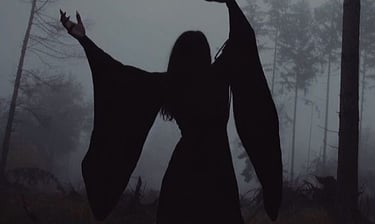History's Scapegoats: The Myth of The 'Evil' Witch
By Eve J. Green
HOMEENTERTAINMENT
Edited by Cece Wilson
10/22/20253 min read


Spirituality has had a number of meanings tied to it throughout history, some good but most negative. These negative connotations are often linked to the spiritual world of witches, religions, cults and so on. Religion is, of course, a very prominent form of spirituality that has been consistent throughout history, but why were witches deemed “evil” when the main goal of both practices was self-growth and becoming the best version of yourself? I want to explore why, in history, these people were punished and falsely accused.
During the early fifteen hundreds, the first of many witch trials began. These trials involved countless hangings and other forms of physical torture that sadly meant the deaths of over sixty thousand individuals over the course of 300 years. It’s hard to say exactly what caused this, but history suggests it was a mix of complex social, economic, political and religious factors. During this time there were many periods of unrest, economic hardship, and of course religious upheaval. The stress of civilians, along with a lack of education and legal authority, led people in power to spread a fear-mongering lie that certain individuals were in contact with the devil or some evil source that could give them immense power. These individuals were called “witches.”
During this period, someone could be accused for something as simple as ongoing misfortune, social conflict, mental illness, or physical differences. Surprisingly, there were many more unremarkable reasons to be prosecuted. One of the more unsettling stories from folklore is that of the Witches of Benevento, from southern Italian folklore associated with the city of Benevento. These women were believed to have been pagan women who held sabbats under a walnut tree. They became associated with the tree itself, flying ointments, and even accusations of child murder. However, this is likely folklore created by the Catholic Church at the time to scare the townspeople. The lines between real and fake were blurred, and women in the town began being accused of witchcraft.
Matteuccia de Francesco was the first woman in the town to be accused, in 1428. She was burned at the stake by her own community. Many women followed, and this lasted up until the early 16th century.
The witch trials eventually stopped with the Enlightenment, as reason and science began to replace superstition, and the use of unreliable spectral evidence was gradually rejected. Even today, though, I feel like fear-mongering is still a huge part of life, especially around politics. I like to think that after the witch trials we changed for the better as a society, but still, many innocent people are wrongly accused. Has that old folklore been transformed into modern-day accusations?
The witch trials are a devastating yet fascinating part of women’s history. Religion, often led by the elites, claimed the moral high ground, wielding greater control, a large following, and a long-standing authority. Witchcraft, rooted in folklore, was deemed inherently evil, leaving little room for genuine understanding of its nature. Today, witchcraft is still practised around the world and is often considered a form of magic focused on self-love and personal growth.
Yet I can’t help but reflect on how these historical events continue to affect women. Even hundreds of years after the trials, witches are still portrayed as “evil.” For instance, in Hocus Pocus, the Sanderson sisters are cast as the enemies, and the plot revolves around stopping them from wreaking havoc on the town. By contrast, magic performed by wizards is often considered “cool” or “exciting.” Take Harry Potter as an example: it is an iconic and beloved story where the wizards are heroes rather than villains. Why is this the case?
As a society, we can acknowledge that sexism has been a pervasive issue throughout history. I personally believe that the witch trials subconsciously reinforced this, providing yet another means to demonise women. Just as the trials were based on folklore, they led to the deaths of many innocent people, fuelled by fear-mongering and lies perpetuated by male elites. It is disheartening to see how this narrative about witches has persisted, even in the ways we celebrate Halloween.
Nonetheless, with all this in mind, I encourage you to reflect on the enduring presence of witches and their wonder throughout this spooky season!
For more, explore fashion, travel, and lifestyle insights here.
Subscribe to our newsletter!
info@femmine.co.uk
